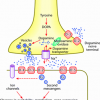Moderator's Note:
The study below demonstrates that nicotine, regardless of administration method causes Smoker's Melanosis, and it is likely that by extension, whether specifically demonstrated or not, this action will accelerate the visible signs of skin aging by a similar uneven discoloration and an increase in the number of moles which smokers and their families get.
The long-term effect of nicotine on the oral mucosa.
Despite never being a smoker, I was intrigued by nicotine and the research surrounding its use in mild cognitive impairment, ADHD, and Depression. One of the things that really brought it to my attention was that ketamine had a metabolite that acting on the nicotinic receptor and that aniracetam also had interactions with the nicotinic receptors. However, I didn't feel aniracetam had a powerful enough action on the nicotinic receptors and I was partically interested in nicotine because of its extreme availability. However, with clear and overwhelming evidence on the harms of smoking I decided to try nicotine gum. And, after going through a 20 pack at Walgreens I quickly bought a 398 pack of 4 mg peices for $59.99 at Costco.
I decided to rapidly taper up to 7 4 mg pieces since the patient for cognitive decline was for 14 mg and since the gum has 50-60% biovailability, from what I could gather, I doubled it. Therefore, consuming a daily 28 mg in nicotine gum per day.
However, due to the efficacy and cost effectiveness of the nicotine, I increased it further to 40 mg (10 4 mg pieces / day). Which, still has been very well tolerated with the only side effects being feeling stimulated and a mild tingling in my mouth when nicotine was being absorbed with a slight decreased interest in food during the day.
When pairing caffeine 200 or 400 mg with nicotine, its to further enhance nicotine's subjective effects despite 200 mg by itself not really being distinguishable from placebo on its own in my experience.
This morning,
I consumed my typical Rx medications for my depression, narcolepsy, and ADHD
Adderall Xr 30 mg (ADHD, Narcolepsy)
Strattera 80 mg (ADHD)
Effexor 150 mg (MDD)
Tenex 1 mg (ADHD)
Nuvigil 225mg (Narcolepsy, Excessive daytime sleepiness from hereditary sleep apnea [meaning not caused by or worsened by things like excessive weight or inactivity])
However, I included the addition of the "supplements"
Nicotine Polacrilex 12 mg (4 mg within 30 min of waking, Then 8 mg after consuming my caffeine source)
*I also consumed breakfast consisting of 1 fruit 3 carbs with roughly 12-15g of fiber in those total and 750 kcal
and
160 mg of caffeine w/ 25 mg of l theanine via a sugar free NOS energy drink (16 oz)*
* I normally consume coffee, green tea, and black tea. However, I bought 2 16 oz sugar free NOS to celebrate the positive results of nmda antagonism and muscrinic antagonism w/ GSK3B inhibition and High affinity choline uptake inhibition being tolerable and plausible based on my own notes and trials.
Anyway, I believe this combination of nicotine and caffeine has improved the speed at which I wake up, increasing my alertness, decreasing my fatigue, increasing my interest in things I enjoy, as well as my organizations, and over all happiness.
But, there is many confounding variable in my case example and a sample size of one is much to small to draw some meaningful conclusions. However, I hope this might provoke some discussion into the nootropic potential of a combination of nicotine and caffeine.
Edited by YOLF, 25 March 2017 - 01:23 AM.



















































